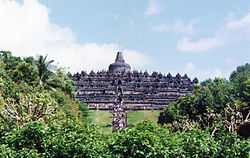This article is written like a personal reflection, personal essay, or argumentative essay that states a Wikipedia editor's personal feelings or presents an original argument about a topic. (May 2017) |
This article needs attention from an expert in Indonesia. The specific problem is: Requires detailed review and condensing of over-long, questionably sourced and potentially speculative text. (March 2017) |
| Part of a series on |
| Religion of Java |
|---|
 |
The Wali Songo (also transcribed as Wali Sanga, English: Nine Saints) are revered saints of Islam in Indonesia, especially on the island of Java, because of their historic role in the spread of Islam in Indonesia. The word wali is Arabic for "trusted one" or "friend of God" ("saint" in this context), while the word sanga is Javanese for the number nine.
Although referred to as a group, there is good evidence that fewer than nine were alive at any given time. Also, there are sources that use the term "Wali Sanga" to refer to saintly mystic(s) other than the most well-known nine individuals.
Each man is often attributed the title sunan in Javanese, which may derive from suhun, in this context meaning "honoured".[1]
Most of the wali were also called raden during their lifetimes, because they were members of royal houses. (See "Style and Title" section of Yogyakarta Sultanate for an explanation of Javanese nobility terms.)
The graves of the Wali Sanga are venerated as locations of ziarah (ziyarat) or local pilgrimage in Java.[2] The graves are also known as pundhen in Javanese.
- ^ Ricklefs, M.C. (1991). A History of Modern Indonesia since c.1300, 2nd Edition. London: MacMillan. pp. 9–10. ISBN 0-333-57689-6.
- ^ Schoppert, P., Damais, S., Java Style, 1997, Didier Millet, Paris, pp. 50, ISBN 962-593-232-1